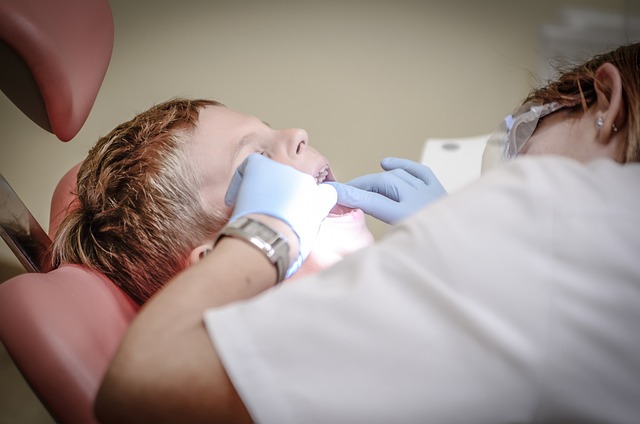Uncovering the Truth: Post-Dental Work Canker Sores Explained
Welcome to another informative article that aims to bring clarity to your dental concerns! Today, we will delve into the mysterious world of post-dental work canker sores. We all know that feeling of relief after completing our much-needed dental procedures, but sometimes, we are left with unexpected canker sores. Fear not! In this article, we will uncover the truth behind these pesky sores, explore their possible causes, and provide you with practical solutions to alleviate any discomfort. So sit back, relax, and let’s embark on a friendly journey of understanding post-dental work canker sores together!
1. Introduction: Understanding the Mystery of Post-Dental Work Canker Sores
Have you ever experienced the frustration of developing canker sores after dental work? We understand how painful and bothersome these sores can be, which is why we are here to shed some light on this mystery. In this post, we will explore the causes behind post-dental work canker sores and provide you with useful tips on how to prevent and manage them.
The Causes:
Canker sores, also known as aphthous ulcers, are shallow, painful lesions that can form inside your mouth. While the exact cause of post-dental work canker sores may vary from person to person, several factors can contribute to their development. Here are some common causes:
- Trauma: Dental procedures can cause minor injury or irritation to the delicate tissues in your mouth, leading to the formation of canker sores.
- Bacterial infections: Occasionally, various bacteria present in the oral cavity can invade the damaged tissue, increasing the risk of canker sore development.
- Allergies or chemical irritants: Some individuals may have a sensitivity or allergic reaction to certain dental materials, such as metals or acrylics, which can trigger canker sores.
By understanding these potential causes, you can take proactive steps to prevent post-dental work canker sores. Stay tuned for our next section, where we will dive deeper into effective prevention and management strategies!

2. The Basics: What are Canker Sores and Why Do They Occur after Dental Procedures?
Canker sores, also known as aphthous ulcers, are small and painful sores that can develop inside your mouth. They can occur on the inside of your lips, cheeks, tongue, or throat. These sores are typically round or oval in shape, with a white or yellowish center and a red border.
Canker sores can appear after certain dental procedures, such as orthodontic treatment or a dental cleaning. While the exact cause of canker sores is unclear, several factors can contribute to their development. These include:
- Accidental trauma to the tissues during the dental procedure
- Chemical irritants present in dental products or medications used during the procedure
- Stress or anxiety related to the dental visit, which may weaken the immune system and increase susceptibility to canker sores
If you experience canker sores after a dental procedure, it’s essential to maintain good oral hygiene to promote faster healing. Be sure to keep the affected area clean by gently brushing with a soft-bristled toothbrush and a mild toothpaste. Avoid any harsh or alcohol-based mouthwashes that can irritate the sores. Instead, rinse your mouth with a saltwater solution or an antimicrobial mouthwash recommended by your dentist.

3. The Role of Dental Work: Unveiling the Connection between Procedures and Canker Sore Formation
Are you someone who frequently develops canker sores after dental procedures? You’re not alone! Many individuals experience this frustrating phenomenon and wonder why it happens. Today, we’re here to shed some light on the connection between dental work and canker sore formation, helping you understand why these sores can sometimes appear after visits to the dentist.
1. Minor Trauma: Dental procedures, especially those involving extensive drilling or scraping, can cause minor trauma to the mouth tissues. Although the dentist’s goal is to minimize any potential damage, it’s common for these procedures to result in tiny cuts or abrasions. These small injuries are often the perfect entry point for a canker sore to develop.
2. Localized Irritation: Some dental materials used during procedures may cause localized irritation to the soft tissues in the mouth. For instance, certain dental adhesives or filling materials can have an acidic or irritating effect on oral tissues, triggering the formation of canker sores. It’s crucial to note that each individual’s response to these substances may vary, as some people may be more prone to developing canker sores than others.

4. Possible Causes: Exploring the Factors Leading to Canker Sores after Dental Treatments
Canker sores are a common occurrence for many individuals after dental treatments. These painful ulcers can make it difficult to eat and speak comfortably, hindering day-to-day activities. While the exact cause of canker sores is still not completely understood, researchers have identified several potential factors that may contribute to their development. Exploring these causes can help both dental professionals and patients better understand and manage canker sores.
Possible causes of canker sores after dental treatments include:
- Oral Trauma: Accidental biting, aggressive brushing, or sharp dental instruments during treatments can lead to irritations and small tissue injuries that pave the way for canker sore formation.
- Certain Foods: Consuming acidic or spicy foods in the immediate post-treatment period can potentially trigger canker sores or exacerbate existing ones. Citrus fruits, tomatoes, and hot peppers are examples of such foods.
- Allergic Reactions: Some individuals may be sensitive or allergic to certain dental materials used during treatments, such as metals or adhesives. Allergic reactions can manifest as canker sores in the oral cavity.
- Stress and Hormonal Changes: Psychological stress, hormonal fluctuations, or lack of sleep can weaken the immune system, making individuals more susceptible to canker sores post-dental treatments.
It is important to note that these factors may not apply to everyone, and each individual’s experience can vary. Consulting with a dental professional is advised to determine the underlying cause of canker sores and develop an appropriate treatment plan for effective relief.

5. Prevention is Key: How to Minimize the Occurrence of Canker Sores Post-Dental Work
While canker sores can be quite bothersome and uncomfortable, there are steps you can take to minimize their occurrence after dental work. By following a few simple guidelines, you can promote faster healing and reduce the chances of developing canker sores. Here are some tips to keep in mind:
- Maintain good oral hygiene: Brush your teeth gently twice a day and floss daily to keep your mouth clean and free from harmful bacteria. This will help prevent any irritation or infection that could lead to canker sores.
- Avoid spicy or acidic foods: These types of foods can irritate the delicate tissues in your mouth, increasing the likelihood of canker sore formation. Opt for a soft and non-acidic diet during the healing period.
- Manage stress levels: Stress has been linked to canker sore outbreaks. Engage in stress-reducing activities like exercise, meditation, or hobbies that help you relax. Taking care of your mental well-being can have a positive impact on your overall oral health.
Remember, prevention is always better than cure when it comes to canker sores. By following these preventive measures, you can significantly reduce the chances of developing these painful ulcers post-dental work, allowing you to focus on a swift recovery and a healthy smile.
6. Managing the Discomfort: Tips and Remedies for Soothing Post-Treatment Canker Sores
Dealing with the discomfort of post-treatment canker sores can be a challenging experience. Thankfully, there are several tips and remedies you can try to soothe the pain and promote faster healing. Here are some helpful suggestions:
- Rinse with salt water: Mix half a teaspoon of salt in a glass of warm water and use it as a mouthwash. Rinse your mouth with this solution at least four times a day to help reduce inflammation and relieve pain.
- Apply a baking soda paste: Make a paste by combining a small amount of baking soda with a few drops of water. Apply this paste directly onto the canker sore, leave it on for a few minutes, and then rinse your mouth. Baking soda can help alleviate pain and facilitate healing.
- Use over-the-counter numbing gels: There are various gels available specifically formulated to numb the pain caused by canker sores. Apply a small amount onto the affected area to temporarily relieve discomfort.
Remember to avoid certain foods and drinks that can irritate the canker sores, such as spicy or acidic foods, citrus fruits, and carbonated drinks. Additionally, maintaining good oral hygiene by regularly brushing your teeth and using a soft-bristled toothbrush can help prevent further irritation. If the pain persists or the sore doesn’t improve after two weeks, it’s advisable to consult your healthcare professional for further guidance.
7. When to Seek Professional Help: Identifying when Canker Sores Require Dental Attention
When dealing with canker sores, it’s important to know when it’s necessary to seek professional dental help. While most canker sores heal on their own within 1-2 weeks, there are certain situations where dental attention is required. Here are some signs that indicate it’s time to consult a dentist:
- Severe pain: If the pain caused by the canker sore becomes unbearable and over-the-counter treatments aren’t providing relief, it may be time to see a dentist.
- Large or recurring sores: If the canker sore is unusually large, lasts longer than 2 weeks, or frequently reoccurs in the same location, it’s important to have it examined by a dental professional.
- Difficulty eating or speaking: Canker sores that interfere with your ability to eat, drink, or speak comfortably should be evaluated by a dentist to identify potential underlying causes.
Furthermore, if you experience other symptoms alongside canker sores, such as fever, swollen lymph nodes, or excessive drooling, it’s recommended to seek professional help. A dentist will be able to evaluate your condition accurately and provide appropriate treatments to alleviate the discomfort caused by canker sores.
8. Debunking Myths: Common Misconceptions about Post-Dental Work Canker Sores
Don’t let common misconceptions about post-dental work canker sores confuse you anymore! We’re here to debunk some of those myths and set the record straight. So, let’s address these misconceptions head-on:
Myth 1: Dental work causes canker sores.
- Fact: Contrary to popular belief, canker sores aren’t caused by dental procedures themselves.
- They may occur due to prolonged irritation from dental tools, cheek biting, or even increased stress during the treatment.
- It’s important to note that canker sores can also arise independent of any dental work, caused by factors like certain food sensitivities, viral infections, or hormone fluctuations.
Myth 2: Canker sores are contagious.
- Fact: You can breathe a sigh of relief – canker sores are not contagious!
- Unlike cold sores, which are caused by the herpes simplex virus and can be easily transmitted, canker sores are not caused by viruses.
- They are purely localized irritations that develop on the inside of the mouth and cannot be passed on to others through contact.
Now that you have a clearer understanding, it’s essential to separate fact from fiction when it comes to post-dental work canker sores. Remember, if you experience persistent discomfort or have concerns, it’s always best to consult with your dentist for personalized advice and proper diagnosis.
9. Long-Term Effects: Understanding the Outlook for Individuals with a History of Dental-Related Canker Sores
Individuals who have a history of dental-related canker sores may experience some long-term effects. While these effects vary from person to person, it is important to understand and be prepared for what they might be. Here are some key points to consider:
1. Increased susceptibility to canker sores: Having a history of dental-related canker sores may make you more prone to experiencing them in the future. Certain factors, such as stress, hormonal changes, or injury to the mouth, can trigger their recurrence. However, implementing good oral hygiene practices and following your dentist’s recommendations can help minimize their occurrence.
2. Impact on oral health: Canker sores can affect not only your comfort but also your overall oral health. Chronic or severe canker sores may interfere with eating, drinking, and speaking, leading to discomfort and difficulty performing daily activities. Additionally, if left untreated, canker sores can increase the risk of bacterial infections.
10. Conclusion: Empowering Patients with Knowledge to Navigate Post-Dental Work Canker Sores
In conclusion, arming yourself with knowledge on how to navigate post-dental work canker sores is crucial in empowering patients to effectively manage discomfort and promote quick healing. By implementing a few simple strategies, you can take control of your oral health and minimize the impact of canker sores:
1. Proper Oral Hygiene: Maintaining a good oral hygiene routine, including brushing your teeth twice a day, flossing daily, and using an antimicrobial mouthwash, can help prevent canker sores and support healing after dental procedures.
2. Avoiding Trigger Foods: Certain foods, such as citrus fruits, spicy foods, and sharp-edged snacks, can aggravate canker sores. Limiting your intake of these trigger foods can help prevent additional discomfort and speed up the healing process.
Frequently Asked Questions
Q: What are post-dental work canker sores?
A: Post-dental work canker sores, also known as aphthous ulcers, are small, painful sores that can develop in your mouth after undergoing dental procedures or treatments.
Q: What causes canker sores after dental work?
A: The exact cause is unknown, but several factors can contribute to the development of canker sores, such as trauma to the mouth tissues during dental work, stress, a weakened immune system, or certain nutritional deficiencies.
Q: How long do these canker sores typically last?
A: In most cases, post-dental work canker sores heal on their own within 1-2 weeks. However, the healing time may vary for each individual.
Q: Are these canker sores contagious?
A: No, post-dental work canker sores are not contagious. They are not caused by a virus or bacteria, so you don’t have to worry about spreading them to others.
Q: What are the common symptoms of post-dental work canker sores?
A: Symptoms can include a burning or tingling sensation at the site, a round or oval-shaped sore with a white or yellowish center and a red border, pain or discomfort while talking, eating, or brushing teeth, and swollen lymph nodes in severe cases.
Q: How can I alleviate the pain and discomfort caused by these canker sores?
A: You can try rinsing your mouth with a saltwater solution or over-the-counter mouthwash to help reduce pain and promote healing. Avoiding spicy or acidic foods, using a soft-bristled toothbrush, and practicing good oral hygiene can also aid in alleviating the discomfort.
Q: Should I seek treatment from a dentist for my post-dental work canker sores?
A: In most cases, canker sores heal on their own and do not require any specific treatment. However, if the sores persist for more than two weeks, become extremely painful, or if you have recurrent canker sores, it’s advisable to consult your dentist for further evaluation and appropriate treatment options.
Q: Are there any preventive measures to avoid post-dental work canker sores?
A: While canker sores cannot always be prevented, there are steps you can take to reduce the risk. These include managing stress levels, maintaining a balanced diet with adequate vitamins and minerals, practicing good oral hygiene, and informing your dentist about any history of canker sores before undergoing dental procedures.
Q: Can using certain dental products or medications trigger these canker sores?
A: Some individuals may experience sensitivity or irritation from certain dental products like toothpaste or mouthwash that contain sodium lauryl sulfate (SLS). If you suspect this might be the case, you can try switching to SLS-free products to see if it helps. Additionally, some medications can also contribute to the development of canker sores, so it’s important to inform your dentist or doctor about any medications you are currently taking.
Q: How long does it take for the canker sores to completely heal?
A: The healing time can vary for each individual. Generally, post-dental work canker sores take about 1-2 weeks to heal completely, but it’s not uncommon for them to take longer in some cases.
Remember, if you have any concerns or questions about post-dental work canker sores, it’s always best to consult with your dentist for professional advice tailored to your specific situation.
Conclusion
In conclusion, we hope that this article has shed some light on the perplexing issue of post-dental work canker sores. While these ulcers may be a bothersome aftermath of dental procedures, it is important not to panic or jump to conclusions. Remember, they are a fairly common occurrence and usually resolve on their own within a week or two.
By understanding the root causes and preventative measures, you can take proactive steps to minimize their occurrence and alleviate any discomfort. Remember, maintaining good oral hygiene, avoiding trigger foods, and practicing stress management techniques can go a long way in preventing these pesky canker sores.
Furthermore, if you do find yourself experiencing persistent or severe canker sores, don’t hesitate to reach out to your dentist or healthcare provider. They will be able to provide you with the necessary guidance and treatment options to ensure your comfort and peace of mind.
In the end, knowledge truly is power when it comes to uncovering the truth about post-dental work canker sores. Armed with this newfound understanding, you can approach your next dental procedure with confidence, knowing that any transient ulcers that may arise are nothing more than a minor inconvenience. So, keep that smile shining bright and embrace your journey towards optimal oral health!






